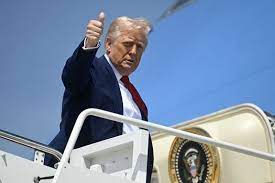Trump to Embark on Middle East Tour to Court Gulf Allies and Investment
Donald Trump is set to begin his first foreign trip since returning to office with a tour of the Middle East this week, aiming to lock down high-value trade, investment, and technology deals with wealthy Gulf allies, even as regional tensions escalate—particularly over the ongoing war in Gaza.
The itinerary closely mirrors his 2017 debut visit to the region, when Gulf monarchies welcomed him as a deal-focused leader aligned with their economic and strategic agendas. Now, Trump is once again expected to push a transactional approach in meetings with leaders in Saudi Arabia, Qatar, and the United Arab Emirates.
Key discussions will center around oil, economic partnerships, arms deals, and regional conflicts in Gaza and Yemen, as well as renewed talks over Iran’s nuclear ambitions. But according to foreign policy analysts, Trump’s primary objective is to return home with tangible wins he can frame as victories for American interests.
“He’s clearly after big announcements—multi-billion-dollar deals that reinforce his ‘America First’ message,” said Steven A. Cook, a senior fellow for Middle East and Africa Studies at the Council on Foreign Relations.
Cook noted Trump’s foreign policy is heavily shaped by his economic worldview, which sees Gulf nations and their vast sovereign wealth funds as crucial sources of investment for U.S. infrastructure and business.
Trump has already touted a $1 trillion Saudi commitment to U.S. investments and hopes to secure additional headline-making agreements during Monday’s meetings. These would align with his domestic-focused strategy and bolster his image as a president who delivers results.
Gulf nations, in turn, are expected to seek access to advanced U.S. semiconductor technology, while Saudi Arabia is reportedly eager to finalize a civilian nuclear deal. Unlike past negotiations, the Trump administration has separated the nuclear talks from the issue of normalizing ties with Israel, marking a significant policy shift.
Noticeably absent from the itinerary is a stop in Israel—an omission that has raised eyebrows as tensions flare over Prime Minister Benjamin Netanyahu’s Gaza offensive. Netanyahu’s government is facing international backlash over proposed plans to expand military operations in Gaza and forcibly displace Palestinians, a move critics have called ethnic cleansing.
The war in Gaza is expected to overshadow Trump’s Gulf meetings. Saudi Arabia has insisted that normalization with Israel remains off the table unless there is a clear path to a two-state solution. Other Arab nations have echoed these concerns, rejecting any plan to resettle Palestinians from Gaza in neighboring countries—a proposal originally floated during Trump’s first term.
“He could have included Israel in the trip like he did last time,” said Elliot Abrams, a former deputy national security adviser under George W. Bush. Abrams added that Defense Secretary Pete Hegseth had also canceled a planned Israel visit. “Israel knows Trump will be hearing ‘Gaza, Gaza, Gaza’ every day in the Gulf. It’s not an ideal moment for U.S.-Israel relations.”
Observers say Trump has stepped back from trying to mediate the conflict directly. His administration recently announced it would negotiate a new humanitarian aid deal for Gaza without Israeli involvement, marking a shift in approach amid the territory’s deepening humanitarian crisis since the last ceasefire collapsed in March.
“Trump is the only one who speaks the same political language as Netanyahu,” said Ami Ayalon, former head of Israel’s Shin Bet security service. “He remains central to everything in the region—from hostages to the broader Israeli-Palestinian relationship.”
As Trump looks to score political and economic wins, he is also expected to make a symbolic announcement during his Saudi visit—potentially renaming the “Persian Gulf” as the “Arabian Gulf” in U.S. discourse. This would likely provoke Iran, which is already wary of warming U.S.-Gulf ties amid fragile negotiations over its nuclear program.
Unlike in 2017, Gulf leaders today appear cautiously supportive of renewed U.S.-Iran talks but remain unclear about Washington’s long-term strategy. “They hear statements, but they don’t see cohesive U.S. policies,” said Jon Alterman of the Center for Strategic and International Studies. “The U.S. speaks with many voices, and its actions are scattered.”
Trump has reportedly tasked his son-in-law Jared Kushner with coordinating pre-trip negotiations. Kushner, who played a key role in the original Abraham Accords, is now working behind the scenes to explore Saudi participation in the accords. However, his involvement is raising questions again due to his family’s business ties in the region.
With overlapping economic, political, and military interests at play, some question whether Trump’s team has the coherence or bandwidth to execute a comprehensive regional policy. Several advisers have argued for deprioritizing the Middle East in favor of confronting China and reinforcing U.S. interests in the Indo-Pacific.
“There’s a disconnect between what Trump says he’s negotiating and what’s actually happening,” said Cook. “His focus is clearly domestic—securing investments and short-term wins. When it comes to the region, he’d rather the problems just go away.”

